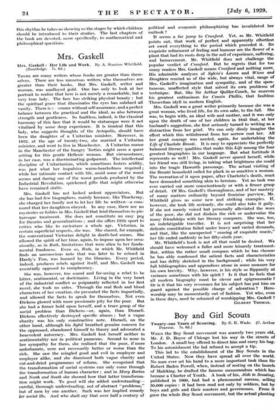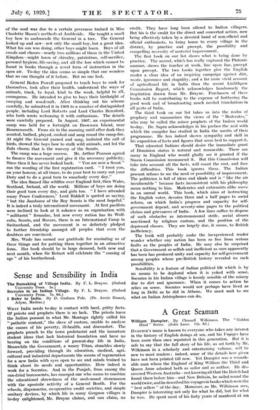Boy and Girl Scouts
WHEN the Boy Scout movement was scarcely two years old, Mr. J. D. Boyce of Chicago lost his way in the streets of London. A small boy offered to direct him and carry his bag. To his astonishment the lad refused to accept a tip.
This led to the establishment of the Boy Scouts in the United States. Now they have spread all over the world. No man ever set his hand to a more important task than Sir Robert Baden Powell, when, instead of resting on the laurels of Mafeking, he drafted the famous memorandum which has- become a Charter of Youth. A book of his, Aids to Scouting, published in 1900, had had a phenomenal success, selling 50,000 copies : it had been read not only by soldiers, but by boys and girls and their masters and governesses. From it grew the whole Boy Scout movement, but the actual planting of the seed was due to a -certain governess trained in Miss Charlotte Mason's methods at Ambleside. She taught a small boy how to ambuscade the General in a tree. The General
• looked up and saw—not only the small boy, but a great idea. What his son was doing, other boys might learn. Boys of all creeds and classes nearly two millions of them in the United Kingdom—might learn of chivalry, patriotism, self-sacrifice, personal hygiene, life-saving, and all the lore which cannot be found in books through a novel form of instruction in the open air. To-day the idea seems so simple that one wonders that no one thought of it before. But no one had.
General Baden Powell proposed to teach boys to cook for themselves, look after their health, understand the ways of animals, track, be loyal, kind to the weak, helpful to all, courageous. He intended to give to boys their birthright of camping and woodcraft. After thinking out his scheme carefully, he submitted it in 1906 to a number of distinguished people, including Lord Roberts and Lord Charles Beresford, who both wrote welcoming it with enthusiasm. The details were carefully prepared. In August, 1907, an experimental camp was held for a fortnight on Brownsea Island, near Bournemouth. From six in the morning until after dark they scouted, bathed, played, cooked and sang round the camp-fire. At night the General yarned and sang, imitated the call of birds, showed the boys how to stalk wild animals, and led the Zulu chorus that is the war-cry of the Scouts.
The camp was a huge success. Mr. Arthur Pearson agreed to finance the movement and give it the necessary publicity. Since then it has never looked back. "You are now a Scout" ran the wording of the first registration card. "I trust you, on your honour, at all times, to do your best to carry out your Duty and to do a good turn to somebody every day."
The idea flamed like wildfire over England first, then Wales, Scotland, Ireland, all the world. Millions of boys are doing their good turn every day, and girls too. "I have attended many Peace Conferences," Lord Riddell is quoted as saying, "but the Jamboree of the Boy Scouts is the most hopeful." It is indeed a truly international movement. At first pacifists were inclined to look at it askance as an organization with " militarist " formulae, but now every nation has its Wolf- cubs, Scouts, and Rovers, there is an International Camp in Switzerland, and the movement is so definitely pledged to further friendship amongst all peoples that even the doubters are convinced.
Mrs. Wade has earned our gratitude for reminding us of these things and for putting them together in an attractive form. Her book should be in large demand, both now and next month, when Sir Robert will celebrate the "coming of age" of his brotherhood.











































 Previous page
Previous page